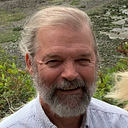Letter to Eco-Anxious Youth
If you are in your twenties or younger, 1984 might seem like ancient history. But 38 years ago I was young like you, and also vulnerable to environmental doomsdayism. That was when a certain geology professor sent me into one of my blackest personal depressions, for he predicted that our entire species would soon go extinct, just like the dinosaurs. His specialty was the Jurassic period, so his prediction carried extra weight for me at the time.
In retrospect, the man was a total ass.
Geologists can no more predict the future than stock analysts, and no responsible (or wise) scientist would claim otherwise.
In retrospect I also see how the geology professor had something in common with chronic gossips and backbiters: he loved being the bearer of bad news, no matter how invented. I look back with a sort of morbid fascination at his weird ego-trip.
For many years I delivered an opposite message. I don’t want young people to be anxious about the environment because that doesn’t help young people or the environment.
People predisposed to “activism” might find that protesting about environmental matters improves their mental health. There can be value in that, but protesting itself tends to be superficial and ultimately ineffective. It is the romantic version of politics, not the realistic one. We really don’t need to “raise more awareness” when we’re already overly saturated with environmental news. A better approach, I would argue, would be continuing with as much formal education as possible. People cleaning up toxic waste dumps and inventing viable green technology tend to have advanced degrees in science and engineering. Those educated in the humanities have a better chance of discerning things like the patterns of politicized science — that knowledge may not erase your vulnerability, but it can help temper it.
If you can afford it and need a break from formal education, volunteering among the poor (at home or abroad) can actually help the environment. Impoverished people can only focus on the basics of survival; they cannot afford to worry about proper garbage disposal or air and water pollution, much less about climate change. But as societies prosper, they naturally clean up their environments. Thus, addressing human economic poverty not only helps people, but also eventually helps solve environmental problems.
When I was young I was poor. I had no choice except to work, but that was often a welcomed relief from formal education. I also had some luxury regarding picking and choosing what work I pursued. I wanted to do honorable work, and at a couple of points, I had the honor to plant tens of thousands of trees in Virginia and Oregon. In the Oregon treeplanting, I also had the great privilege to work beside Mexican migrants— easily the hardest working laborers I have ever witnessed in my entire life. The xenophobic nationalists have no idea what they are missing.
Keep in mind, people have been predicting “end of days” for millennia. The atomic bombs of 1945 ushered in the modern apocalyptic worldview. Technically speaking, there are still more than enough nuclear bombs to end mammalian life on earth several times over . . . but few mention this fact anymore. The moral of the story might be, doomsday fads come and go. If the earth goes into a cold spell (entirely possible, given what we know about paleoclimatology), the global warming version of doomsday will likely disappear.
Since the atomic age, thousands of doomsdayists have predicted the end of the world as we know it, but by now most of them have died of old age. And, I would strongly argue, the chances of you dying from old age are far greater than death from ecological disaster! It’s a guess, I admit. But here in my own later years, I want to offer this optimistic proposition for you and your future great grandchildren. Progressive environmental stewardship is everywhere; you just rarely hear about it in popular culture.
Remember that mainstream media (and now its social media extensions) are often more interested in sensational bad news, the more sensational (and the more dire) the better. With some education and effort, you will begin to see that the scientific “truth” is often more nuanced, uncertain, and definitely more ambiguous than what the doomsayers claim. Good science entertains endless questions and is very cautious about offering conclusions. Religious crusades (including the green variety) entertain no questions about their own foregone conclusions. Such is the nature of crusades.
Please forgive an old fart for offering this unsolicited advice, but when I read about youth suffering from eco-anxiety I could not help but get a little irritated at the doomsayers. It also made me remember my own youthful vulnerability regarding the state of the environment.
Oh, and remember the geology professor doomsdayist? That old bastard is long dead and we’re all still here.
I hope you will cultivate your gifts, then (if possible) contribute benevolently to others as your personality, skills, and proclivities dictate. If you get a chance, don’t forget to plant some trees. Live long and carry on!
Copyright © 2022 Will Sarvis. All rights reserved.
